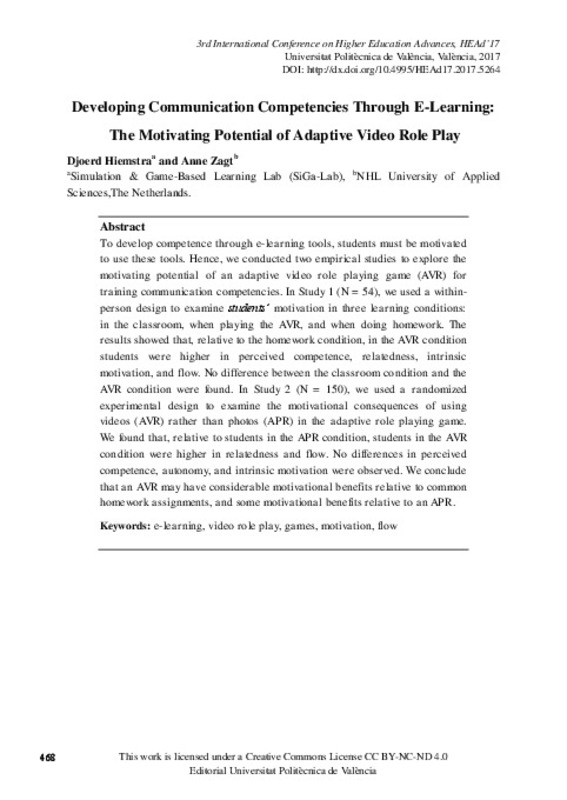JavaScript is disabled for your browser. Some features of this site may not work without it.
Buscar en RiuNet
Listar
Mi cuenta
Estadísticas
Ayuda RiuNet
Admin. UPV
Developing Communication Competencies Through E-Learning: The Motivating Potential of Adaptive Video Role Play
Mostrar el registro sencillo del ítem
Ficheros en el ítem
| dc.contributor.author | Hiemstra, Djoerd
|
es_ES |
| dc.contributor.author | Zagt, Anne
|
es_ES |
| dc.date.accessioned | 2018-06-20T06:32:45Z | |
| dc.date.available | 2018-06-20T06:32:45Z | |
| dc.date.issued | 2017-06-26 | |
| dc.identifier.isbn | 9788490485903 | |
| dc.identifier.uri | http://hdl.handle.net/10251/104384 | |
| dc.description.abstract | [EN] To develop competence through e-learning tools, students must be motivated to use these tools. Hence, we conducted two empirical studies to explore the motivating potential of an adaptive video role playing game (AVR) for training communication competencies. In Study 1 (N = 54), we used a within-person design to examine students’ motivation in three learning conditions: in the classroom, when playing the AVR, and when doing homework. The results showed that, relative to the homework condition, in the AVR condition students were higher in perceived competence, relatedness, intrinsic motivation, and flow. No difference between the classroom condition and the AVR condition were found. In Study 2 (N = 150), we used a randomized experimental design to examine the motivational consequences of using videos (AVR) rather than photos (APR) in the adaptive role playing game. We found that, relative to students in the APR condition, students in the AVR condition were higher in relatedness and flow. No differences in perceived competence, autonomy, and intrinsic motivation were observed. We conclude that an AVR may have considerable motivational benefits relative to common homework assignments, and some motivational benefits relative to an APR. | es_ES |
| dc.format.extent | 9 | es_ES |
| dc.language | Inglés | es_ES |
| dc.publisher | Editorial Universitat Politècnica de València | es_ES |
| dc.relation.ispartof | Proceedings of the 3rd International Conference on Higher Education Advances | es_ES |
| dc.rights | Reconocimiento - No comercial - Sin obra derivada (by-nc-nd) | es_ES |
| dc.subject | Higher Education | es_ES |
| dc.subject | Learning | es_ES |
| dc.subject | Educational systems | es_ES |
| dc.subject | Teaching | es_ES |
| dc.subject | E-learning | es_ES |
| dc.subject | Video role play | es_ES |
| dc.subject | Games | es_ES |
| dc.subject | Motivation | es_ES |
| dc.subject | Flow | es_ES |
| dc.title | Developing Communication Competencies Through E-Learning: The Motivating Potential of Adaptive Video Role Play | es_ES |
| dc.type | Capítulo de libro | es_ES |
| dc.type | Comunicación en congreso | es_ES |
| dc.identifier.doi | 10.4995/HEAD17.2017.5264 | |
| dc.rights.accessRights | Abierto | es_ES |
| dc.description.bibliographicCitation | Hiemstra, D.; Zagt, A. (2017). Developing Communication Competencies Through E-Learning: The Motivating Potential of Adaptive Video Role Play. En Proceedings of the 3rd International Conference on Higher Education Advances. Editorial Universitat Politècnica de València. 468-476. https://doi.org/10.4995/HEAD17.2017.5264 | es_ES |
| dc.description.accrualMethod | OCS | es_ES |
| dc.relation.conferencename | Third International Conference on Higher Education Advances | es_ES |
| dc.relation.conferencedate | June 21-23,2017 | es_ES |
| dc.relation.conferenceplace | Valencia, Spain | es_ES |
| dc.relation.publisherversion | http://ocs.editorial.upv.es/index.php/HEAD/HEAD17/paper/view/5264 | es_ES |
| dc.description.upvformatpinicio | 468 | es_ES |
| dc.description.upvformatpfin | 476 | es_ES |
| dc.type.version | info:eu-repo/semantics/publishedVersion | es_ES |
| dc.relation.pasarela | OCS\5264 | es_ES |








